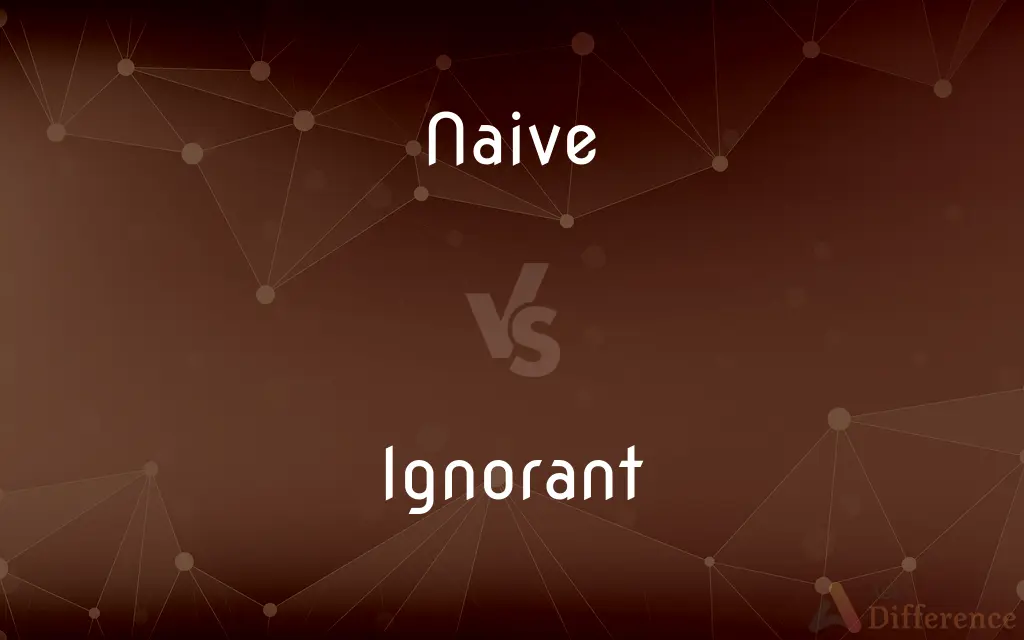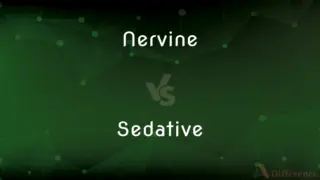Naive vs. Ignorant — What's the Difference?
By Tayyaba Rehman & Urooj Arif — Updated on March 15, 2024
Naive implies a lack of experience or judgment, while ignorant denotes a lack of knowledge or awareness about a specific subject.

Difference Between Naive and Ignorant
Table of Contents
ADVERTISEMENT
Key Differences
Naivety often suggests innocence or a purity of perception, where an individual may not be aware of the complexity of a situation or the likelihood of negative outcomes. This is typically due to a lack of exposure rather than a willful disregard. Ignorance, on the other hand, involves a lack of knowledge or information about a particular topic or issue, which could be due to not having learned something or choosing not to learn.
While naive people might be overly trusting or fail to recognize subtleties in social cues or intentions, being ignorant means not knowing facts, concepts, or perspectives that could be essential for informed decision-making. Naivety can stem from limited life experiences, whereas ignorance can be rectified through education or personal effort to acquire knowledge.
The term naive is not necessarily negative; it can reflect a willingness to see the best in others or situations without cynicism. Ignorance, however, is often viewed more critically, as it implies a gap in understanding that might be overcome through learning or inquiry.
In some contexts, naivety is seen as a transient state that diminishes with age or experience, suggesting a journey toward sophistication or realism. Ignorance, while it can also be temporary, often requires a deliberate action to overcome, such as researching, asking questions, or otherwise engaging with new information.
Both naivety and ignorance influence how individuals interact with their world, but they do so in different ways: naivety affects one's expectations and interactions on a more personal level, while ignorance pertains more to one's knowledge base and how it informs actions or beliefs.
ADVERTISEMENT
Comparison Chart
Definition
Lack of experience or judgment
Lack of knowledge or awareness
Implications
Innocence, trustfulness
Uninformed, unaware
Cause
Limited exposure or experience
Absence of learning or inquiry
Perceived Negativity
Less negative, often seen as innocence
More negative, implies a need for education
Overcoming
Gained through experience
Gained through education and inquiry
Compare with Definitions
Naive
Fails to see underlying complexities or risks.
He made a naive decision, not foreseeing the consequences.
Ignorant
Can lead to poorly informed decisions or opinions.
Their ignorant vote was based on hearsay rather than facts.
Naive
Not worldly or sophisticated in judgment.
The naive tourist was easily swindled in the busy market.
Ignorant
Often perceived negatively as it suggests a gap that should be filled.
Remaining ignorant of the law is not an excuse for breaking it.
Naive
May imply openness to experiences without suspicion.
His naive approach made him well-liked, if occasionally taken advantage of.
Ignorant
Unaware due to not having learned something.
He was ignorant of the basic rules of the game, having never played before.
Naive
Experience gradually diminishes naivety.
She became less naive about the music industry after her first tour.
Ignorant
Ignorance can be remedied through learning.
She overcame her ignorance on climate change by reading extensively.
Naive
Shows a hopeful or trusting outlook without cynicism.
Her naive belief in fairytale endings was endearing.
Ignorant
Ignorance can be a choice to not know or learn.
His ignorant stance was more about avoiding the truth than not having access to information.
Naive
Simple and guileless; artless
A child with a naive charm.
Ignorant
Lacking knowledge or awareness in general; uneducated or unsophisticated
He was told constantly that he was ignorant and stupid
Naive
Unsuspecting or credulous
Naive victims of the scam.
Ignorant
Discourteous or rude
This ignorant, pin-brained receptionist
Naive
Showing or characterized by a lack of sophistication and critical judgment
"this extravagance of metaphors, with its naive bombast" (H.L. Mencken).
Ignorant
Angry or quick-tempered
She could be very ignorant and he had no intention of getting involved in an argument just now
I had to walk out before I got ignorant
Naive
Not previously subjected to experiments
Testing naive mice.
Ignorant
Lacking education or knowledge.
Naive
Not having previously taken or received a particular drug
Patients naive to antipsychotic medication.
Ignorant
Showing or arising from a lack of education or knowledge
An ignorant mistake.
Naive
One who is artless, credulous, or uncritical.
Ignorant
Unaware or uninformed
Was ignorant of the drug's harmful effects.
Naive
Lacking worldly experience, wisdom, or judgement; unsophisticated.
Ignorant
Unknowledgeable or uneducated; characterized by ignorance.
Naive
Not having been exposed to something.
Ignorant
Not knowing (a fact or facts), unaware (of something).
Naive
(of art) Produced in a simple, childlike style, deliberately rejecting sophisticated techniques.
Ignorant
(slang) Ill-mannered, crude.
His manner was at best off-hand, at worst totally ignorant.
Naive
Intuitive; designed to follow the way ordinary people approach a problem.
Ignorant
(obsolete) unknown; undiscovered
Naive
A naive person; a greenhorn.
Ignorant
Resulting from ignorance; foolish; silly.
Naive
Having native or unaffected simplicity; ingenuous; artless; frank; as, naïve manners; a naïve person; naïve and unsophisticated remarks.
Ignorant
One who is ignorant.
Naive
Having a lack of knowledge, judgment, or experience; especially, lacking sophistication in judging the motives of others; credulous; as, a naive belief in the honesty of politicians.
Ignorant
Destitute of knowledge; uninstructed or uninformed; untaught; unenlightened.
He that doth not know those things which are of use for him to know, is but an ignorant man, whatever he may know besides.
Naive
Marked by or showing unaffected simplicity and lack of guile or worldly experience;
A teenager's naive ignorance of life
The naive assumption that things can only get better
This naive simple creature with wide friendly eyes so eager to believe appearances
Ignorant
Unacquainted with; unconscious or unaware; - used with of.
Ignorant of guilt, I fear not shame.
Naive
Lacking experience of life;
A callow youth of seventeen
Ignorant
Unknown; undiscovered.
Ignorant concealment.
Alas, what ignorant sin have I committed?
Naive
Lacking sophistication
Ignorant
A person untaught or uninformed; one unlettered or unskilled; an ignoramous.
Did I for this take pains to teachOur zealous ignorants to preach?
Ignorant
Lacking general education or knowledge;
An ignorant man
Nescient of contemporary literature
An unlearned group incapable of understanding complex issues
Exhibiting contempt for his unlettered companions
Ignorant
Ignorant of the fundamentals of a given art or branch of knowledge;
Ignorant of quantum mechanics
Musically illiterate
Ignorant
Lacking basic knowledge;
How can someone that age be so ignorant?
Inexperienced and new to the real world
Ignorant
Used of things; lacking sense or awareness;
Ignorant hope
Fine innocent weather
Ignorant
Lacking knowledge or skill;
Unversed in the jargon of the social scientist
Ignorant
Lacking information or knowledge;
An unknowledgeable assistant
Common Curiosities
Can a person be naive but not ignorant?
Yes, someone can be inexperienced or overly trusting without necessarily lacking knowledge about a specific subject.
Is being naive the same as being ignorant?
No, naive implies a lack of experience, while ignorant refers to a lack of knowledge.
Is it worse to be considered naive or ignorant?
This depends on context; however, ignorance is often viewed more negatively because it suggests a gap in knowledge that could be filled with effort.
Do these terms apply only to individuals, or can groups be naive or ignorant?
Both terms can apply to groups or societies, reflecting collective experiences or knowledge gaps.
How do naivety and ignorance affect decision-making?
Naivety might lead to decisions based on overly optimistic or trusting assumptions, while ignorance results in decisions made without full understanding of the facts.
How can one overcome naivety or ignorance?
Naivety is often overcome with life experiences, while ignorance can be addressed through learning and inquiry.
How do societal views on naivety and ignorance differ?
Societies may romanticize naivety as purity or innocence, whereas ignorance is typically seen as a deficiency needing correction.
How does one's environment influence naivety or ignorance?
Environment plays a crucial role, as exposure to diverse experiences and information can reduce both naivety and ignorance.
How do these concepts relate to wisdom?
Wisdom often involves overcoming naivety through experience and addressing ignorance through a commitment to lifelong learning.
Can ignorance be willful?
Yes, when an individual chooses not to acquire knowledge or information that is available to them.
Is there a cultural aspect to naivety or ignorance?
Cultural background and education systems significantly impact what is considered naive or ignorant in different contexts.
Is ignorance always a negative trait?
While often viewed negatively, ignorance can simply indicate areas for growth and learning, and is not inherently a reflection of one's character.
Are there positive aspects to being naive?
Being naive can sometimes reflect a positive, open-hearted approach to life and people, often associated with youth or a refreshing trust in others.
What role does education play in combating ignorance?
Education is key to combating ignorance, providing the knowledge and critical thinking skills necessary to understand complex issues.
Can naivety be beneficial in any context?
In some cases, a naive perspective can lead to original thinking or approaches unburdened by conventional wisdom.
Share Your Discovery

Previous Comparison
Nervine vs. Sedative
Next Comparison
Murmur vs. WhisperAuthor Spotlight
Written by
Tayyaba RehmanTayyaba Rehman is a distinguished writer, currently serving as a primary contributor to askdifference.com. As a researcher in semantics and etymology, Tayyaba's passion for the complexity of languages and their distinctions has found a perfect home on the platform. Tayyaba delves into the intricacies of language, distinguishing between commonly confused words and phrases, thereby providing clarity for readers worldwide.
Co-written by
Urooj ArifUrooj is a skilled content writer at Ask Difference, known for her exceptional ability to simplify complex topics into engaging and informative content. With a passion for research and a flair for clear, concise writing, she consistently delivers articles that resonate with our diverse audience.















































